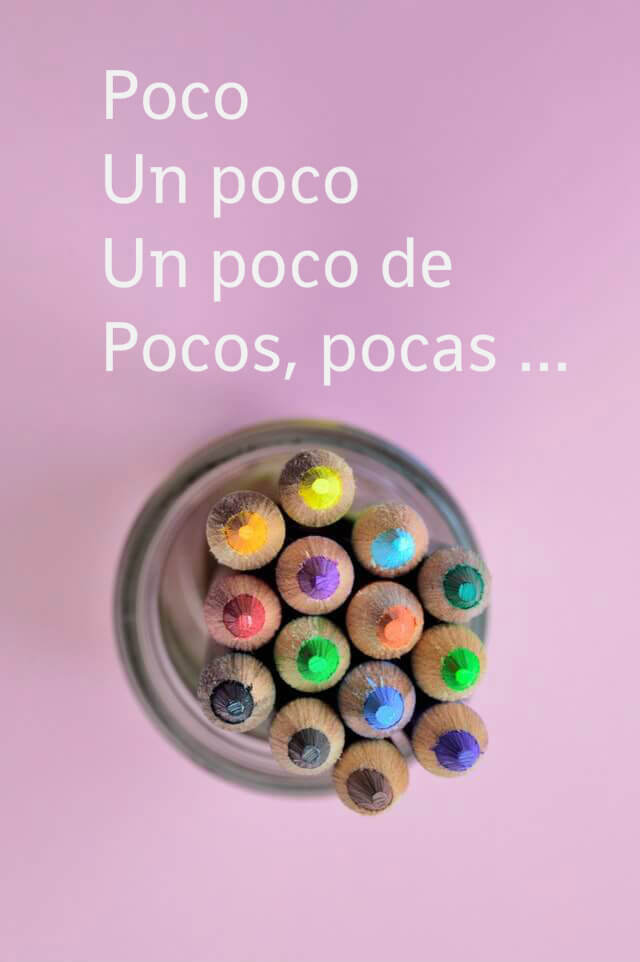Poco, un poco, pocos...

What is the difference between "un poco" and "poco"? Can I say "una poca"?
These questions are what made me write this blog post, so let's answer them:
Before a noun
In this case, we'll be talking about amount of something.
There will be agreement with the noun in gender and number: poco, poca, pocos, pocas.
These are the different combinations and translations in this case:
Uncountable nouns - poco/ un poco de
Poco/a - little/ a bit + uncountable noun
Poco dinero - little money
Poca ensalada - little salad
Poca comida - little food
Not talking about "small" salad or "small" money, but the amount of money and salad.
Also, we can say "un poco de"
Un poco de dinero - a bit of money
Un poco de ensalada - a bit of salad
Un poco de comida - a bit of food
Countable nouns - pocos/pocas
Unos/as pocos/as - only a few of + countable noun
Pocos/as - only a few of + countable noun
Unos pocos niños - a few kids
Pocos niños - only a few kids
Unas pocas personas - a few persons
Pocas personas - only a few persons
Careful with:
Poca gente - only a few people
Poca ropa - only a few clothes
These are uncountable in Spanish, and collective (singular noun referring to plural items) and we will translate the sentence as "only a few" in English.
With a verb - poco / un poco
When we use "poco" with a verb is usually expressing intensity or frequency.
There is no agreement in gender and number because there's no noun to agree with.
These are the common combinations:
Un poco -
a bit (small amount) / for a bit (not for too long)
Poco -
not too intensely, not in big amount, not frequently
The difference is subtle and slightly different depending on the verb, so let's see some examples and you can take conclusions:
Correr un poco- to run for a little bit (not for a long time, not a long distance)
Correr poco - To run only a bit, not very frequently, not too intense.
Comer un poco - to eat a bit (of food)
Comer poco - to eat very little food normally, not too much or not too frequently.
Pensar un poco - to think for a bit
Pensar poco - To usually not think a lot
Comprar un poco - To buy a bit (of food, clothes...), not a big amount.
Comprar poco - To not buy frequently or in big amounts
Enfadarse un poco - To get a bit angry
Enfadarse poco - To rarely get angry, not often
Ser/estar (un) poco ...
This would be translated as "to be a little bit..." or "to not be very...".
Be careful because you might think you need to agree "poco" with the adjective and the person, but you shouldn't, still modifies the verb (how much you ARE that).
Un poco / algo
Ser un poco + adjective (quality)- to be a little bit ...
Estar un poco + adjective (feeling) - to be feeling a bit...
Usually the quality/feeling is negative:
Ex:
Es un poco nerviosa - She's a bit nervous.
Está un poco nerviosa - She's feeling nervous (temporarily, because we're using "estar").
Somos un poco extraños - We're a little bit strange.
Son un poco celosos - They're a bit jealous.
Estáis un poco tristes - You guys are feeling a bit sad (temporarily).
We can use "algo" instead of "un poco" in these situations and the meaning wouldn't change:
Es algo nerviosa, está algo nerviosa, somos algo extraños, son algo celosos, estáis algo tristes
Poco
Ser poco + adjective (quality)- to not be very ...
Estar poco + adjective (feeling) - to not be feeling very...
In this case, the quality/feeling can be negative or positive.
Again, "poco" doesn't change because it doesn't agree in gender and number with any noun.
Ex:
Soy poco ordenada -I'm not very tidy.
Están poco preocupados - They're not very worried.
Somos poco exagerados - We're not very exaggerated.
Eres poco generosa - You're not very generous.
Practice
1- Hay _______ pasta y pollo en la cocina
There's a bit of pasta and chicken in the kitchen.
2- Tengo ________ tiempo para salir.
I have little time to go out.
3- Hay ______ cosas que me molestan.
There are only a few things that bother me.
4- Mario es _______ calmado.
Mario is not very calm.
5- Nosotros somos ______ impacientes.
We're a little bit impatient.
6- Están ______ emocionados .
They are not very excited .
7- Sé que estás __________ estresado.
I know you are (feeling) a bit stressed.
8- Había ____ gente en el concierto.
There were a few people in the concert.
9 - Él tiene __________ sillas extra.
He has a few extra chairs.
10 - Tienes que beber ______ de agua.
You need to drink a bit of water
11- Limpian _________.
They clean only a bit /not a lot.
12- Hice ______ ejercicio
I did a bit of exercise.
13- Escribió ______
She wrote for a little bit
Sol: unpocode/poco/pocas/poco/unpoco/poco/unpoco/unapoca/unaspocas/unpocode/poco/unpocode/unpoco
And that is a wrap!
Hope that was helpful,
See you in the comments section below if you have something to add or ask, otherwise, ¡hasta la vista!